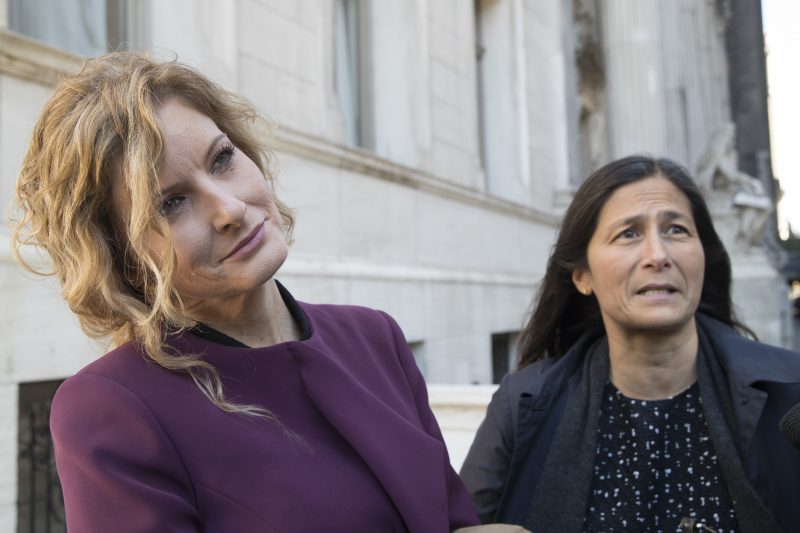Manhattan Appeals Court Questions Reach of State Courts in Defamation Suit Against Trump
Members of the panel at oral argument questioned the breadth of a state court's authority if it did have jurisdiction over a sitting president, going so far as to consider if it could hold the president in contempt.
October 18, 2018 at 05:25 PM
6 minute read
 Summer Zervos, left, and her attorney Mariann Wang speak to reporters outside New York state appellate court, Thursday, Oct. 18, 2018, in New York. President Donald Trump's lawyers hope to persuade an appeals court to dismiss or delay Zervos' claim that he defamed her by calling her a liar after she accused him of unwanted kissing and groping. (AP Photo/Mary Altaffer)
Summer Zervos, left, and her attorney Mariann Wang speak to reporters outside New York state appellate court, Thursday, Oct. 18, 2018, in New York. President Donald Trump's lawyers hope to persuade an appeals court to dismiss or delay Zervos' claim that he defamed her by calling her a liar after she accused him of unwanted kissing and groping. (AP Photo/Mary Altaffer)
Manhattan appellate division justices grilled lawyers for President Donald Trump and an ex-contestant on “The Apprentice” reality TV show over the implications of extending New York state courts' reach to the occupant of the Oval Office.
Members of the panel at oral argument questioned the breadth of a state court's authority if it did have jurisdiction over a sitting president, going so far as to consider if it could hold the president in contempt.
Summer Zervos' defamation suit against Trump, which was filed three days before Trump was inaugurated, explores the relatively uncharted waters of the power of a state court over the country's highest executive.
Trump, represented in the case by his longtime lawyer Marc Kasowitz, is appealing Manhattan Supreme Court Justice Jennifer Schecter's ruling in March that the supremacy clause of the U.S. Constitution does not bar a plaintiff from turning to a state court to file suit against the president.
On Thursday, a five-judge panel from the Appellate Division, First Department peppered Kasowitz and Cuti Hecker Wang partner Mariann Meier Wang, lead counsel for Zervos, with questions about the reach of a New York state court into the Oval Office.
“It's possible to sue a sitting president in New York City small claims court, according to your analysis. Is that correct?” Justice Peter Tom asked Wang during arguments, to which she answered in the affirmative.
The justices also asked Wang if a state court judge could order the arrest of a sitting president for contempt of court. Wang said a president could be held in contempt, but demurred from answering the question of arrest directly, saying there “are many steps” leading to a judge in a civil case issuing a contempt order.
Justices Angela Mazzarelli and Troy Webber also pushed Kasowitz as to how high up the federal ladder a state court's jurisdiction could reach: could someone sue Vice President Mike Pence in state court, for example?
Kasowitz acknowledged that actions could be brought in state courts against any federal officer except the president, who occupies a special place in the Constitution.
“A state court has no power or no authority under the Constitution” to exercise jurisdiction over the president, Kasowitz said.
Zervos, as California restaurateur and former contestant on “The Apprentice” who was in attendance for the oral arguments, alleges that Trump groped her and subjected her to unwanted kissing in 2007.
Zervos kept quiet about her encounter with Trump until the months leading up to the 2016 presidential election. After she and other women with accusations of sexual misconduct against the then-candidate came forward, Trump refuted his accusers in stump speeches and on Twitter.
Zervos says she was defamed by Trump calling her a liar on Twitter and in campaign events leading up to the 2016 election. She is seeking $3,000 in damages.
“She's received threats; she's been called horrific names,” Wang told the First Department justices.
But Kasowitz has argued throughout the case that subjecting the president to a civil suit could interfere with his official duties and told the justices on Thursday that Zervos is suing Trump to make a political point.
“This is a political case,” Kasowitz said. “This was a case brought by the plaintiff to make a political statement.”
Kasowitz and Wang have little in the way of precedent to draw from in the case: their court papers and many of the appellate judges' questions at oral argument concerned a 1997 ruling by the U.S. Supreme Court finding that President Bill Clinton was not immune from a sexual harassment lawsuit filed in federal court by Paula Jones, who alleged Clinton propositioned her for oral sex in 1991 while he was serving as governor of Arkansas.
Wang noted that Kasowitz has not moved to take Zervos' case to federal court, arguing that the Supreme Court's holding in Clinton v. Jones would preclude him from raising the same type of standing issue at the federal level.
“He doesn't want to face this case,” Wang said. “It's the only reason he didn't remove the case.”
A number of the arguments in the case have centered around a single footnote in the Supreme Court's ruling in Clinton v. Jones, signed by Justice John Paul Stevens, in which the justice said that a state court suit against the president “may implicate concerns that are quite different from the interbranch separation-of-powers questions addressed here.”
Kasowitz Benson Torres attorneys Christine Montenegro and Paul Burgo are also on Trump's defense team.
Zervos is also represented by Cuti Hecker attorneys John Cuti, Eric Hecker, Daniel Mullkoff and Heather Gregorio.
Justices Dianne Renwick and Cynthia Kern also sat on the First Department panel. The panel reserved judgment on the appeal. While the appeal on the standing issue is under advisement, back in Manhattan Supreme Court, attorneys for Trump and Zervos will continue in their clash over discovery issues.
Zervos' attorneys have filed a motion to compel Trump to turn over information about other women who have similarly accused Trump of sexual misconduct; Trump's team has derided the motion as an effort to harass the president and distract him from his official duties.
Zervos argues that other women have come forward will allegations of misconduct that follow a similar pattern to her own experience: Trump would arrange private meetings with the alleged victims and “proceed to kiss them on the mouth and grope them, including by grabbing their breasts, buttocks or vaginas.”
A hearing on the pending motion to compel in scheduled for next week.
Read more:
Manhattan Appeals Court to Mull Whether Trump Must Face Ex-'Apprentice' Contestant's Defamation Suit While in Office
Ex-'Apprentice' Contestant Argues She Needs Info on Other Trump Accusers in Defamation Suit
Trump Pushes Back on Ex-'Apprentice' Contestant's Effort to Get Info About More Accusers
This content has been archived. It is available through our partners, LexisNexis® and Bloomberg Law.
To view this content, please continue to their sites.
Not a Lexis Subscriber?
Subscribe Now
Not a Bloomberg Law Subscriber?
Subscribe Now
NOT FOR REPRINT
© 2025 ALM Global, LLC, All Rights Reserved. Request academic re-use from www.copyright.com. All other uses, submit a request to [email protected]. For more information visit Asset & Logo Licensing.
You Might Like
View All
New York-Based Skadden Team Joins White & Case Group in Mexico City for Citigroup Demerger

Bankruptcy Judge Clears Path for Recovery in High-Profile Crypto Failure
3 minute read
US Judge Dismisses Lawsuit Brought Under NYC Gender Violence Law, Ruling Claims Barred Under State Measure
Trending Stories
- 1New York-Based Skadden Team Joins White & Case Group in Mexico City for Citigroup Demerger
- 2No Two Wildfires Alike: Lawyers Take Different Legal Strategies in California
- 3Poop-Themed Dog Toy OK as Parody, but Still Tarnished Jack Daniel’s Brand, Court Says
- 4Meet the New President of NY's Association of Trial Court Jurists
- 5Lawyers' Phones Are Ringing: What Should Employers Do If ICE Raids Their Business?
Who Got The Work
J. Brugh Lower of Gibbons has entered an appearance for industrial equipment supplier Devco Corporation in a pending trademark infringement lawsuit. The suit, accusing the defendant of selling knock-off Graco products, was filed Dec. 18 in New Jersey District Court by Rivkin Radler on behalf of Graco Inc. and Graco Minnesota. The case, assigned to U.S. District Judge Zahid N. Quraishi, is 3:24-cv-11294, Graco Inc. et al v. Devco Corporation.
Who Got The Work
Rebecca Maller-Stein and Kent A. Yalowitz of Arnold & Porter Kaye Scholer have entered their appearances for Hanaco Venture Capital and its executives, Lior Prosor and David Frankel, in a pending securities lawsuit. The action, filed on Dec. 24 in New York Southern District Court by Zell, Aron & Co. on behalf of Goldeneye Advisors, accuses the defendants of negligently and fraudulently managing the plaintiff's $1 million investment. The case, assigned to U.S. District Judge Vernon S. Broderick, is 1:24-cv-09918, Goldeneye Advisors, LLC v. Hanaco Venture Capital, Ltd. et al.
Who Got The Work
Attorneys from A&O Shearman has stepped in as defense counsel for Toronto-Dominion Bank and other defendants in a pending securities class action. The suit, filed Dec. 11 in New York Southern District Court by Bleichmar Fonti & Auld, accuses the defendants of concealing the bank's 'pervasive' deficiencies in regards to its compliance with the Bank Secrecy Act and the quality of its anti-money laundering controls. The case, assigned to U.S. District Judge Arun Subramanian, is 1:24-cv-09445, Gonzalez v. The Toronto-Dominion Bank et al.
Who Got The Work
Crown Castle International, a Pennsylvania company providing shared communications infrastructure, has turned to Luke D. Wolf of Gordon Rees Scully Mansukhani to fend off a pending breach-of-contract lawsuit. The court action, filed Nov. 25 in Michigan Eastern District Court by Hooper Hathaway PC on behalf of The Town Residences LLC, accuses Crown Castle of failing to transfer approximately $30,000 in utility payments from T-Mobile in breach of a roof-top lease and assignment agreement. The case, assigned to U.S. District Judge Susan K. Declercq, is 2:24-cv-13131, The Town Residences LLC v. T-Mobile US, Inc. et al.
Who Got The Work
Wilfred P. Coronato and Daniel M. Schwartz of McCarter & English have stepped in as defense counsel to Electrolux Home Products Inc. in a pending product liability lawsuit. The court action, filed Nov. 26 in New York Eastern District Court by Poulos Lopiccolo PC and Nagel Rice LLP on behalf of David Stern, alleges that the defendant's refrigerators’ drawers and shelving repeatedly break and fall apart within months after purchase. The case, assigned to U.S. District Judge Joan M. Azrack, is 2:24-cv-08204, Stern v. Electrolux Home Products, Inc.
Featured Firms
Law Offices of Gary Martin Hays & Associates, P.C.
(470) 294-1674
Law Offices of Mark E. Salomone
(857) 444-6468
Smith & Hassler
(713) 739-1250







